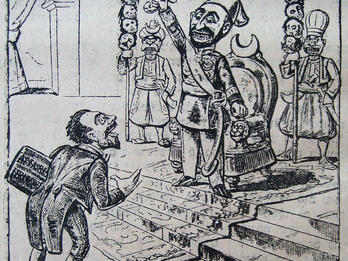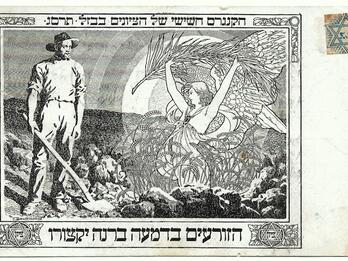The Mizrachi Manifesto
Pave the way! Pave the way!1
More than twenty years have passed since the idea that we now call Zionism began to reawaken among the Jews, though its essence and intensity had never ceased among the Jews from the time of the first prophets. The shifting hands of times—turning good into evil—touched us and woke us from a long slumber, urging us to seek a refuge for the thousands of our brethren whose circumstances were destroyed by antisemitism (hatred of the Semites). Yet, had the Jews felt nothing but the troubles of their bodies, that is, the lack of security and the decline in their livelihoods, they would not have chosen just Zion alone.
However, along with the sorrow from external circumstances, concurrently, perhaps more powerfully, an inner feeling was awoken within many heartfelt people; they became clearly aware that the people’s soul, which is our Holy Torah, could no longer continue to exist in full force in a state of wandering, and that its commandments, which alone are the source of its spirit, could no longer be preserved in their essential purity, from the times that continue to assail us with harsh demanding requirements—that are imposed on us—which cannot be satisfied only by averting one’s eyes from the holy treasure entrusted to us at Sinai; and, God forbid, we take [the Torah] lightly, and every one of us wanders in their own way, perforce we will forego our Jewish essence, [intermingling with] the vast majority, for there he finds things ready for those secular needs which the times demand of him.
The sentiment of the nation found only one remedy for this blow: to direct the hearts of the Jews to a single place, to the hill which all mouths turned, [saying] “to Zion and Jerusalem,” the place where they plan to find desired rest for the poor folk of our nation. The ancient hope—implanted in the roots of our religion, that only in Zion will God grant the salvation of Israel—has always united us. The demand for equal rights, which our brothers in Germany hoped for, has scattered us even more in our dispersion; that is to say: it has destroyed our unity as a single nation—since with the scattering of the members, the body continues to come apart, and with no body, the soul has no place upon which to be in this world. Therefore, it is agreed in the hearts of those who love the spirit of their nation and are faithful to the Torah of their God, that the resurrection of hope for the return to Zion will also give a secure foundation, a special quality to our people, an ingathering of our souls, and an assurance of our Torah and all its sacred objects.
This spirit has also descended upon our rabbis, the esteemed scholars of the generation, from whose mouths we live, and they were the first to stand at the helm of the movement to return to Zion. However, because the nature of the matter brought about that members of every corner of our nation participated in this return to Zion, everyone came with their own opinions, and people who had been educated beyond the boundary of faithful Judaism brought foreign customs and external nonsense with them, which could not be acceptable to the community of God-fearing Jews who cling to our holy Torah, which alone is the source of their spirit. Some of our eminent scholars saw this and withdrew, and some became adversaries of the very idea. The rabbis and other scholars who continued to hold fast to the banner of Zion found no satisfaction, and they were perplexed and despaired for many days, without knowing how to peel off the foreign shells that clung to the essence, and therefore many of our God-fearing brethren refrained from lending their hands to the matter.
Little by little, the God-fearing among the Zionists began to reveal their thoughts to one another, until they joined in counsel [and determined to] send choice men of knowledge, including eminent rabbis to Vilna on the 25th and 26th of Adar I (March 1–2, 1902), to clarify there what Zionism was in their opinion, and to separate what belonged from what did not, to remove the mixed multitude and present it in its purity to the eyes of the whole community of their God-fearing friends, and to call upon them, every man from his place, to take part it in wholeheartedly. They convened, and every one of them revealed to his fellow the issues of those who had sent them—reasons many people despised Zionism—and these are:
- Gatherings of men and women together in some youth groups associated with the name of “Zion”;
- The new literature created by proponents of the new culture [kultura], which is mingled with the idea of Zionism and intends to establish it on the nonsense of foreign culture [tarbut], that the spirit of our Torah and the spirit of our nation can by no means tolerate;
- The reformed education according to some of this literature, which, in the realized sense, makes knowledge of the language and history the primary pursuit and reduces the study of Torah as secondary, and it fills every area of study with new methods, without there being any more time, place, or desire to study the written Torah, and needless to say not the Oral Law, and in the intellectual aspect this education seeks to imbue our children with the nonsense external spirit which some of the literature of those with the new culture [kultura] advocates;
- Their preachers, though there are certainly honest and innocent people among them, some of them say things that disgruntle the community of people who cleave to our Torah with all their heart.
Indeed, none of these things, which are brought in from outside, have any true relation or connection to the true essence of Zionism.
However, since there are men from the community of our God-fearing brethren, who place the responsibility for all these things on Zionism, and, as against them, there are men from the sect of the new culture who enforce the aforementioned ideas into Zionism against [its character]; therefore the assembly of God-fearing Zionists who convened in Vilna established a spiritual center [merkaz ruḥani] named Mizrachi to organize their members, who take part with them in their system, in a reasonable and well-made order, to give them a single heart to defend their opinions, and to imbue Zionism in general with the spirit of faithful Judaism, sending to the Congress delegates who are willed to be there, and to strengthen and expand the feelings of religion within the Zionist ambit, and to disseminate the spirit of Zionism in all the territories of our God-fearing brethren wherever they are.
For this purpose the center saw fit to divide Zionism in general into two parts: the body of Zionism, which is simply settlement, [an endeavor] that requires only financing, energy, and intercession to prepare a secure shelter for our people within the land of our ancestors in an open and agreed-upon action on the part of governments; and the spirit that gives life to Zionism. And they decided that:
A. The body of settlement must not be separated from the existing organizations, although among these are people who do not agree with them in matters of the heart, just as in every society for charity and philanthropy, the God-fearing are not to be prevented from participating with those with whom they disagree. [ . . . ]
B. If in all matters of finance and the secular dealings of Zionism, we participate with the rest of the Zionists. But, when it comes to matters that pertain to the heart, we must look inward to ourselves. We find no other fortress before us that will endure or another assurance for the establishment of Zion save the observance of faithful Judaism with all its power and purity. [ . . . ]
C. To raise our children in Torah and good deeds and to plant in their tender hearts the love of Zion, and the hope for the return of exiles, we are greatly in need of modest women. To strengthen hearts and make them love the deeds and the desires we have detailed here, we must make an effort to establish societies of “Daughters of Zion.” Their purpose will be our purpose: to work for both the preservation of Judaism and the love of Zion. [ . . . ]
D. The associations that enter our organization will be supported by preachers, who will preach in the spirit of our Torah and our faithful Judaism. In that we have found no tried and true instrument for the love of Zion, except the Torah and the commandments; thus we can find no instrument to hold a blessing, to preserve the spirit of our Torah in full, and serve as a faithful guarantor to restore the sons’ hearts to their fathers, except for the Zionist movement which stands as a banner for our dispersions to gather around. [ . . . ]
Therefore we call upon all of our God-fearing brethren, whose hearts throbs with love of their religion and their people, to work with us for the Zionist idea—after a central and solid base has been established for the God-fearing, they no longer have any reason to fear lest they be, perish the thought, swept away in the current of erroneous opinions and foreign customs. . . .
Open your eyes and see, pay heed and prepare yourselves, because love of Zion in its purity, without any trace of other opinions, is what unifies our heart in its full capacity and innocence, with the body of our nation and its soul alone, that is, to the Jewish people and its holy Torah, according to the testimony of Scripture, which offers the land of our fathers, which is our ultimate hope, as a trusted instrument for the religion of God, as it is said, “to give you the Land of Canaan to be a God for them.”
Mizrachi
Notes
[Isaiah 57:14.—Eds.]
Credits
Zeev Yavetz, “Solu solu” [The Mizrachi Manifesto], Ha-mizraḥ, Apr. 13, 1902, pp. 2–3.
Published in: The Posen Library of Jewish Culture and Civilization, vol. 7.




